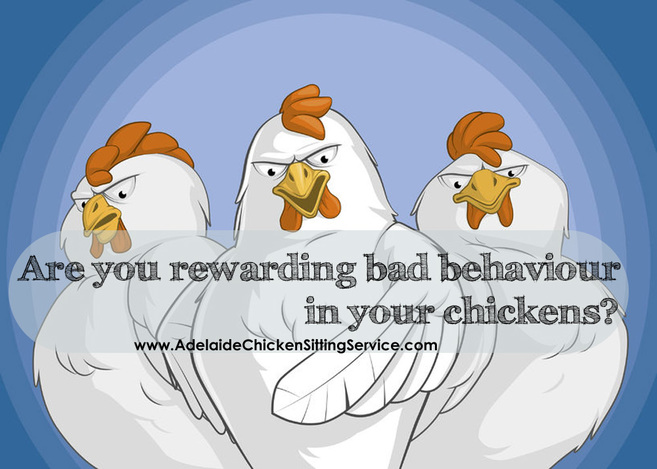Poultry owners can be just a little too kind sometimes and the easiest way to train any animal or bird is with food rewards.
Bad behaviour in poultry begins with rewarding bad behaviour.
#1 SCENARIO: After coming back from school drop off in the morning the chickens are making a loud noise in the yard because its egg laying time. You don't want to upset the neighbours (even though nobody has really complained yet, but there might be night-shift people sleeping), so the only thing you can think of doing is distracting them with a food treat.
RESULT: Bad behaviour has just been rewarded.
Vary any opportunities. Do NOT do this daily. An erratic feeding on a rare day can help. But quite often, just going out to them to talk at them and sit outside with a hot drink will make them curious and quiet.
#2 SCENARIO: The new chickens make so much noise inside their coop before they are let out in the morning. The coop is right near your bedroom window, and you just want them to be quiet for a little longer so you can get some more sleep. So you go out to them in your dressing down and boots with a food treat to quieten them down.
RESULT: Bad behaviour has just been rewarded.
These chickens will never quieten down until you stop food rewards completely.
Change the layout of the coop. If light is what causes them to make the early morning noise, close off light getting in where ever possible. Make sure that their feeder is located within their coop, too, so that they can access their dietary requirements.
#3 SCENARIO: The chickens keep sitting in their nesting box acting broody. You have a heart and can't bear to move them out because it seems so unkind. So you leave her in the nest with food and water.
RESULT: Bad behaviour has just been rewarded.
Quite often these hens gets lice, mites and a loss of body weight as there is no end period until you have stepped up to make them understand this. Loss of body weight also means a lowered immune system which makes it very hard for her to recover. A hatching only takes 21 days. But if she is not hatching, she has no 'calendar' to modify her behaviour. You need to be her guide. Isolate her into a fenced off area in the cool dry shade during the day with access to food and water. Return her to the coop for the night to roost. Continue to do this until her broodiness stops.
#4 SCENARIO: The new chickens won't sit in their roosting rails, preferring the nesting boxes. You leave them there because it seems soft and warm.
RESULT: Bad behaviour has just been rewarded.
Chickens poo all night long which means that they are sitting in it which can lead to other health problems. They are more likely to contract lice and mites as well. In summer time, the over heating of their bodies in the boxes can lead to an early death. They only take 2 weeks of constant evening training to learn to perch.
#5 SCENARIO: The rooster doesn't attack you but he attacks everyone else who goes into his yard. They won't stay to handle them, preferring to run, cry and scream or have no contact at all.
RESULT: Bad behaviour has just been rewarded.
Everyone in your household MUST spend time with the rooster. Holding him securely with one arm to the side of the body while the other hand pushes down his head in a submissive bow. This should be done three (3) times in a row before placing the rooster back down. Do this daily for 1-2 weeks. Take a broom or other defensive object to deflect his advances, but do NOT run, cry or scream otherwise he believes he has won - thus rewarding his efforts.
#6 SCENARIO: Chickens make a growling noise in their nesting boxes when eggs are being collected, which scares the egg collector so much that they throw out a food treat or break one of the eggs to distract the chickens so that they can get to all the eggs.
RESULT: Yes, bad behaviour has once again been rewarded.
Trying to get chickens out of their nesting boxes with treats is not good for their reproductive health. Extending the time it takes for a hen to lay can lead to being egg bound, mis-shaped or blood stained eggs.
If using a broken egg as a treat, this can lead to perpetual egg eating amongst the flock which is very bad vice in poultry. As tho old saying goes, egg-eaters are really only good for the pot if that behaviour does not cease.
Don't worry. We've all fallen into this trap.
The repetitive and predictable nature of receiving the food or comfort reinforces the delinquency.
I have experienced ALL of these problems with my own flocks over the years.
I still have chickens with issues in my garden that I am still trying to find a solution for. Some personalities are harder to curb than others.
What I have learnt is that some breeds of poultry are just not right for me, so I will try some other breeds that better suited to my needs and that are easier for me and my family to cope with.
The GOOD NEWS is that many birds can be modified in their behaviour with a change of behaviour toward them.
Just as food can train them to be bad, it can also be used for training for good behaviour too. Just do NOT reward them at the time of the bad activity.
When you catch your birds doing something good, that's reward time. But remember to keep it to a minimum.




 RSS Feed
RSS Feed